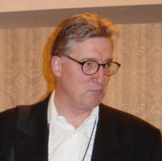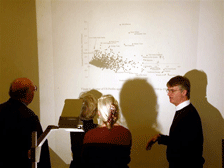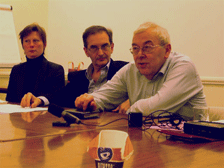NEWSLETTER
Winter 03/04
MOVING HISTORY:
Birkbeck, University
of London - 10 June 2003 Organised
by Frank Gray (Brighton) in collaboration with Laura Mulvey and Ian
Christie (Birkbeck), this well-attended one-day conference addressed
one of the Centre's main themes: how to stimulate greater academic awareness
of archival holdings as a major focus for research - and how to help
archives become more involved in setting the media research agenda. In the
first session, 'The Moving Image and History', two speakers surveyed
the current landscape in which moving image archivists are developing
their collections and working with scholars to understand their cultural
and intellectual meanings. Jan-Christopher Horak, editor of the Association
of Moving Image Archivists' journal The Moving Image, has an
informed knowledge of the issues facing archivists in the digital age,
and also of the challenges presented to archivists and academics by
images from such diverse producers as the studios, television, artists
and amateurs (having worked at Eastman House, the Munich Stadtmuseum
and Universal Studios). Nico de Klerk (Nederlands Filmmuseum) has long
been interested in the archival and scholarly questions posed by non-fiction
material, examples of which he showed. Much of this material is anonymous,
has become detached from specific histories of production and consumption,
and as a result has been kept outside of film/cultural history and scholarship.
How can we re-attach these 'orphans' to history? The second
session brought together three researchers with different interests
who Three
archivists took the platform in the final session: David Pierce, curator
of the NFTVA, David Cleveland, director of the East Anglian Film Archive
and Vanessa Toulmin, of the National Fairground Archive at Sheffield
University. Characterising their collections, they underlined the view
that many potential researchers know little about the holdings, beyond
familiar material, and each gave examples of issues and materials that
would repay further research. A welcome feature of the symposium was
the presence of a number of historians and interested parties not from
within the film archive community. Equally welcome were the practical
examples given of 'discoveries' and of interpretive approaches to specimen
material. Most present felt that the potential of archival research
had been well argued, and that more of such events would usefully carry
this message to a wider constituency of historians. MULTIMEDIA HISTORIES: University of
Exeter - 21-23 July 2003 The Bill
Douglas Centre collection houses, as its website proclaims, the second
largest such collection in Britain, with a wealth of technology, literature
and ephemera spanning the whole history of optical entertainment and
cinema. But even a collection as rich needs research of different kinds
to realise its potential. Following a symposium on 'Early Screen Practice',
organised by John Plunkett during his Centre Fellowship in 2002, which
provided some useful experience, 'Multimedia Histories' was an ambitious
international conference focused on the impact of multimedia culture,
understood as having a long genealogy stretching back long before contemporary
multimedia. Among the themes examined by some fifty-six speakers were
the relationship between screen technologies, optical recreations and
popular culture, especially in the 18th and 19th centuries, leading
on to consideration of such relationships being reconfigured by the
electronic and digital technologies of the later 20th and 21st centuries.
Many of the presentations focused on specific historical moments of
convergence and hybridity, or on speculative parallels - as in, for
instance, Alison Griffiths' (CUNY) 'Woven Spectacles: medieval Tapestries
as Precursors to IMAX', Lauren Rabinovitz's (Iowa) 'History of Somatic
Visual Culture through Hale's Tours, IMAX and Motion Simulation Rides'
and Michelle Henning's (UWE) 'The World-Wide Web as Curiosity Museum'.
FILM HISTORY
IN QUESTION Senate House,
University of London - 21 November 2003 This study
day was organised jointly with the Screen Studies Group, affiliated
to London University's School of Advanced Study, and comprising Birkbeck,
King's College, Royal Holloway, Queen Mary College, University College.
A decade
after David Bordwell identified the 'basic story' of film history, with
its attendant aesthetic assumptions, does this still hold sway in Britain?
Has the history of cinema taken account of other historians' debates?
Has it had any impact on their work? Can film history be regarded as
a legitimate field of historical inquiry, or is it merely a branch of
criticism? Could it be part of art history, or of 'comp. cin.' on the
model of 'comp. lit.'? And finally, where does the venerable organising
principle of national cinema history stand today? 1 The
history of what, exactly? Film texts,
genres, periods, aesthetic positions, makers, audiences, industries?
Perspectives on what objects and processes film history can or should
study - from Richard Brown (independent scholar; co-author, A Victorian
Enterprise: the British Biograph Company); Christine Gledhill (Staffordshire;
Reframing British Cinema, 1918-1928; co-ed, Reinventing Film Studies,
etc); John Sedgwick (author of Popular Film-Going in 1930s Britain,
seen below explaining his cluster graph of film success to fellow panellists).
Chair: Ian Christie (Birkbeck). Fringe
or foundation? Avant-garde film occupies different places in different
national traditions, with Britain as chronically ambivalent Do national
cinema histories still make sense? Did they ever? How should British
film history reflect European affiliations as well as American indebtedness?
How does film history relate to national history: can we read the latter
in the former, and vice-versa? Discussion by Claire Monk (De Montfort;
co-editor, British Historical Cinema); Geoffrey Nowell-Smith (Luton;
editor, Oxford History of World Cinema). Chaired by Peter William Evans
(Queen Mary College). Pictured below. Discussion
was lively during the day, with a welcome number of postgraduate students
present and participating. Among the most striking contributions were
John Sedgwick's account of his economics-based approach to measuring
film popularity and success, using a range of data largely ignored by
traditional film historians; and David Mellor's questioning of the idea
of 'avant-garde' in relation to British traditions of whimsy and subversive
comedy.
LOOKING
BACK AT 2003
Centre
partners organised two one-day conferences and a major three-day event
during 2003.
EVENTS
FILM ARCHIVES AND ACADEMIC RESEARCH

Jan-Christopher
Horak, founding vice president of Association of Moving Image Archivists
and curator of the Hollywood Entertainment Museum was the keynote
speaker at Moving History.
have each drawn directly on film archive
collections and generated new knowledge about these, as well as fostering
interdisciplinary studies. Tim Boon is Head of Collections at the Science
Museum, and was previously its Curator of Public Health. As well as
writing on the history of health publicity, he has studied key British
documentary films of the 30s to reveal the ideologies of history, industrialisation
and society which they articulate. Elizabeth Lebas is senior lecturer
in Visual Culture and media at Middlesex University, where she leads
the MA in Architectural and Spatial Culture. Her research interest in
urban ideas and projects between the wars led her to write the first
major article about the Bermondsey health promotion films which are
held by the Imperial War Museum and the NFTVA, and so amplify the understanding
of 'documentary' in the 20s and 30s. Bert Hogenkamp, head of research
at the Netherlands Institute for Sound and Vision in Hilversum and a
professor at Utrecht, is well known as an historian of British left
and labour film; and on this occasion he talked about archival discoveries
of amateur film from the 50s which show a continuing radical aspiration
in unexpected quarters.
FROM THE MAGIC LANTERN TO THE INTERNET
Video gaming, interactivity and the impact of recent 'new media' on
conceptions of narrative and spectatorship were also recurrent
themes of the conference, which began with a stimulating plenary lecture
by Richard Grusin (Wayne State), co-author of the influential Remediation:
Understanding new media, entitled 'Cinema of Interactions: DVDs, Video
Games and the Aesthetic of the Inanimate', and ended with a 'show and
tell' presentation by Ian Christie, 'Toys, Machines, Instruments', using
examples of kaleidoscopes and stereoscopes from the Bill Douglas collection
to explore the history of terminologies and perceived uses that have
determined how new media are categorised.
New forms of theorisation of pre-cinema practices were in evidence,
with an account of the android as 'synthespian' by Dan North (Exeter)
and a new approach to Reynaud's Praxinoscope by Cathryn Vasseleu (Sydney).
Non-visual media were also not forgotten: William Boddy (CUNY) contributed
another plenary on 'Early Wireless and Multimedia History', and Charlie
Gere drew suggestive parallels between John Cage and the development
of defence technologies.
Above all, the conference demonstrated the continuing potential of themes
such as intermediality, interactivity and hybridity to provide a strong
conceptual base on which many detailed and specific studies could be
fruitfully pursued, and historians of different periods can find common
ground. Media history and theory seem to be alive, increasingly in dialogue,
and thriving. A publication based on the conference and edited by James
Lyons and John Plunkett, is in preparation.

In a round-table setting, the aim was to create a forum for discussion
of broad issues in the conception and writing of 'film history', with
speakers organised in three panels and each invited to present a brief
polemical statement as a prelude to debate. The questions at issue were
outlined as follows.
2 Where do we put the avant-garde (and where do we find it)?
about film as about its other art-forms when
these are compared with other cultures. Is avant-garde film best kept
apart from histories of the commercial medium, or does it need to be
integrated? Discussion by David Curtis (Experimental Film; programmer
and head of the Centre's British Artists' Film and Video Study Collection
at Central Saint Martins); Malcolm LeGrice (Central Saint Martins; author,
Abstract Film and Beyond and leading film artist); and David Mellor
(Sussex; curator and editor of the catalogue, A Paradise Lost: Neo-Romanticism
in Britain 1935-55, etc). Chair: Laura Mulvey (Birkbeck).
3 Britain in the world; the world in Britain
This investigation of current attitudes towards film history in Britain
and the history of British film was intended to contribute to shaping
both the 'London' strand of the Centre programme, about to start at
Birkbeck, and a proposed new history of British cinema, which might
become a future Centre project.